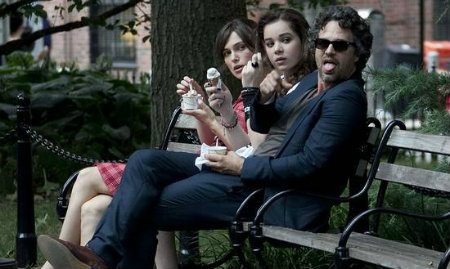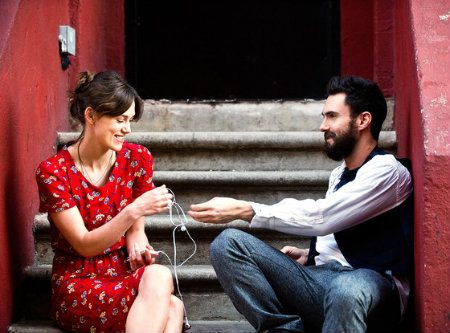Begin Again
Director: John Carney
Cast: Keira Knightley, Mark Ruffalo
Length: 104 mins
Country: USA
It took me a regrettable number of years to embrace John Carney’s 2007 musical Once, a small street-tale informed by heartbreak, yearning and a refreshingly honest portrait of urban life. The vivacious but uncompromising Dublin at the movie’s core proved the perfect backdrop for the film’s beautifully pitched look at second chances and emotional resurgence, underpinned by several intoxicatingly bittersweet songs. The feature’s popularity has endured; profitable box-office and a subsequent stage-show proof enough of its consistent allure and worth in cultural circles. It’s been seven years and people are still talking about Once, as good a sign as any of a work’s longstanding virtue and merit. Begin Again reunites Carney with the musical, taking the action from modest Dublin to a sensationally fictitious portrait of New York. Begin Again boasts a more polished look and is stocked with recognisable talent, but despite revisiting themes of redemption and rebirth (the title’s a dead giveaway) the truthfulness of Once is absent, resulting in an affable drama that plays like a victory lap for independent musicians.
Music executive Dan (Mark Ruffalo) is out of work and separated from his family, nurturing a series of destructive habits to mask encroaching emptiness. Whilst drowning his sorrows, Dan comes across Gretta (Keira Knightley), a young British woman about to flee NYC in the aftermath of a disappointing relationship. Convinced of Gretta’s talent, but unable to secure a deal, Dan takes her to the streets, recording an album on the fly against the backdrop of the City’s buzzing landmarks. The music and subsequent friendship prove beneficial for both parties, healing the wounds of their pasts.
Following my viewing I vowed to avoid comparing Once and Begin Again. A slavish devotion to contrast can suffocate the art of criticism and deny access to the individual merits of a piece. But on second thought that’s a pipedream. The films share such a similar DNA that they appear to be siblings. Once is the rustic but thoughtful son, the boy whose prolonged impact is determined by connection and understanding, the consummate friend, the generous lover, the deep thinker. Begin Again is a more initially prodigious child, all handsome features, effortless ease and a gallery of friends, but with the expectation of greatness outweighed by underwhelming reality with each transitory evolution, until all that’s left is an affable yet unmemorable outline of untapped promise. Begin Again is somebody we can all get along with; a person that occasionally spouts a curious insight over their fourth beer, but who ultimately doesn’t have the stamina or substance to affect the world beyond frivolous pleasantries. Sound harsh? Perhaps it is, but that’s what any parent gets when they raise a game-changer, only for the next nipper to readily adopt ordinariness.
Begin Again boasts a more polished look and is stocked with recognisable talent, but despite revisiting themes of redemption and rebirth (the title’s a dead giveaway) the truthfulness of Once is absent, resulting in an affable drama that plays like a victory lap for independent musicians.
Carney adopts writing duties here, the underlying spirit of the piece in support of independent artists and guerrilla creativity. The film fixates on the music scene, but it wouldn’t take much imagination to see the improvised, street bound album the characters work on as a metaphor for film-makers outside the studio system. Either way, Begin Again clearly wants to damn the pocket-emptying bigwigs intent on profiting off rare, low-fi talent. Given that the film stars a number of A-listers, it’s a commendable stance to take, but the writing lacks the finesse or roundedness to instil the debate with complexity, instead positing an obvious good/bad dichotomy between money and spirit. No character showcases this more clearly than Adam Levine’s pretentious ex, a potentially sweet figure seduced and destroyed by LA Studios and superficial style. The character exists purely as a cautionary tale, juxtaposed with Knightley’s inscrutable angel.
Carney uses a variety of flashback techniques to conjure up the image of a past perfection in their relationship, but the fallout pivots around a broadly articulated commentary on artistic integrity. Characters feel informed purely by theme, rather than character informing theme, which extracts a necessary human spark from the piece. Ruffalo’s slob is much the same, set on an obvious path of redemption before we even really get to know him. On the other hand, through a forgiving but tense altercation with a thief, the lead in Once immediately registers as a complex but decent man, a human-being plighted by regretful circumstance and hurt. Watching Ruffalo refuse to get out of bed in the morning fails to incite the same standard of engagement.
The musical component aims for grace and easy-going accessibility, succeeding in providing a concoction of pleasant melodies. Once definitely integrated its tunes more poignantly, and there’s nothing in Begin Again to match the sweep of “Falling Slowly” or the grounded beauty of “Broken Hearted Hoover Fixer Sucker Guy”. Still, the soundscape washes over Begin Again agreeably, and Knightley in particular proves an accomplished and delicate vocalist. The added allure of Adam Levine means the soundtrack should handily shift units, even if it lacks a big central number. The tunes are spliced organically into the narrative, as the characters roam around New York breathing in its impossible autumnal grandeur. Where Once used an earthy Dublin to heal and grow its adrift leads, Begin Again opts for more fantastical narrative pursuits, healing families, promoting personal fortitude and building unsophisticated friendships within its stretched fairy-tale palette. The script is likable and its characters fundamentally decent, but their recoveries are mapped with none of the intimacy Once so effortlessly mustered. Solutions arise with the signature ease of a standardised Hollywood rom-com.
Begin Again is basked in a golden glow, Carney availing of his heightened budget to imagine perfect streets and cosy bars ideal for depressed A&R men to uncover twee, indie princesses. It’s an inherently inoffensive film, and harbours a soundtrack of definite worth, but it’s impossible not to feel slightly cheated in the wake of the majestic Once. There’s something missing, and I’m inclined to believe that thing is truth. Begin Again is hopeful yet slickly artificial wish-fulfilment.



Comments